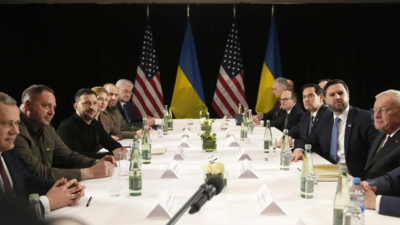EU faces new Nato challenge as US eyes thaw in Russia-Ukraine war – The Times of India

Under the new Donald Trump government, European leaders have voiced a mix of bold rhetoric and candid acknowledgements of a shifting world order. Trump’s policies have starkly contrasted with those of Biden, creating tension, particularly regarding Ukraine and Nato.
Trump’s willingness to negotiate with Russia over the ongoing war in Ukraine, while bypassing Europe and Ukraine itself, has raised alarm. On the other hand, US Vice President, JD Vance, shocked many at the Munich Security Forum with harsh criticism of the European Union. This shift in US policy has also prompted Europe to consider strengthening its own defence capabilities.
There are even suggestions that European nations might need to send troops to Ukraine to help enforce a ceasefire.
On Monday, French President Emmanuel Macron convened urgent talks with key European leaders to present a unified stance. However, the meeting exposed divisions, particularly with German Chancellor Olaf Scholz expressing frustration at British Prime Minister Keir Starmer’s proposal to deploy troops to Ukraine.
This comes when Russian Foreign Minister Sergei Lavrov is scheduled to meet with US Secretary of State Marco Rubio in Saudi Arabia, signalling a closer relationship between the US and Russia.
Poland Prime Minister Donald Tusk remarked that transatlantic relations and NATO have entered a new phase. NATO Secretary-General Mark Rutte echoed that Europe is “ready and willing” to do more, while EU Commission President Ursula von der Leyen called for increased defence spending.
‘Common-value base not that common’
Christoph Heusgen, chairman of the Munich Security Forum, expressed concern after Vance’s speech, saying, “We have to fear that our common-value base is not that common anymore.” Heusgen later clarified that some edited versions of his speech on social media misrepresented his emotions.
Strategic studies professor Phillips O’Brien said Europe’s stunned reaction to the shift in US policy was troubling, emphasizing that Europe should have prepared for this change much earlier.
At the Paris meeting, EU law professor Alberto Alemanno noted significant differences among European countries over whether to commit troops to Ukraine or invest heavily in defence. “The clock is ticking,” he said, urging leaders to act.
‘Political Will’ in question
Latvian President Edgars Rinkevics, whose country borders Russia, said Europe’s defence capabilities are still insufficient despite years of talk about increasing defence spending. He warned that Europe might fall back into complacency once the initial urgency fades.
While the Paris talks didn’t aim to make formal agreements, many leaders agreed on the need to relax EU fiscal rules to allow for higher defence spending.
Danish Prime Minister Mette Frederiksen expressed hope that a deal on defense funding would be reached at the next European Council meeting.
Former Lithuanian Foreign Minister Gabrielius Landsbergis pointed out that the US is no longer willing to be the main security guarantor in Europe and no longer sees the EU as it once did. “Europe can rise to the challenge, but the key is political will. Indecision will lead to a bad outcome,” he warned.
Related
A New Book Argues That What Happens in Europe Doesn’t…
Remaking the World: European Distinctiveness and the Transformation of Politics, Culture, and the Economy by Jerrold Seigel “No issue in world
Poland plans military training for every adult male amid growing…
Poland’s prime minister, Donald Tusk, has said his government is working on a plan to prepare large-scale military training for every adult male in response t
2025 European Athletics Indoor Championships: Ditaji Kambundji secures women’s 60m…
Switzerland’s Ditaji Kambundji walked away from the 2025 European Athletics Indoor Championships in Apeldoorn on 7 March with much more than her first Europea
Takeaways from the EU’s landmark security summit after Trump said…
BRUSSELS (AP) — European Union leaders are trumpeting their endorsement of a plan to free up hundreds of billions of










